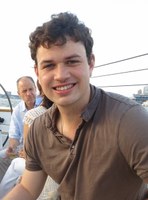The 2015 Danckwerts-Pergamon Prize for the best thesis has been awarded to Chris Boyce at the University of Cambridge

The University of Cambridge has awarded Chris Boyce with the 2015 Danckwerts-Pergamom Prize. This prize is awarded by the Department each year for the best PhD dissertation on a subject connected with Chemical Engineering. The winner is chosen from those students who gained their PhDs in the preceding calendar year.
Chris Boyce was supervised by Prof John Dennis and his thesis title was "Fundamental Studies of the Physics of Gas-Solid Fluidization."
He said, "In my thesis, I used a combination of computational modeling and magnetic resonance imaging (MRI) to create insights into the science underlying fluidized beds, chemical reactors used in industries from oil and gas to pharmaceuticals. In particular, I developed techniques for modeling 3D cylindrical fluidized beds as well as measuring distributions of gas velocities accurately in fluidized beds using MRI. This technique development allowed for insights into the relationship between bubbling patterns and pressure oscillations as well as the ability of analytical theory to predict gas dynamics in different regions of fluidized beds. The ultimate goal of this basic research is to create a base of knowledge upon which engineers can create cleaner and more efficient processes in the chemicals, pharmaceuticals and energy industries. An example of this studied in Prof. Dennis's lab is chemical looping combustion, in which coal, natural gas and biomass can be burned in novel ways, such that it is more efficient to capture and store carbon dioxide which would otherwise be emitted into the atmosphere."
He is now a post-doc working with Prof. Sundaresan in the Multiphase Flow Group in the Department of Chemical and Biological Engineering at Princeton University. In January 2018, he plans to start as an Assistant Professor in the Department of Chemical Engineering at Columbia University, forming a lab which uses computational modeling and tomographic imaging to understand the fundamental science underlying a variety of chemical and energy processes.
